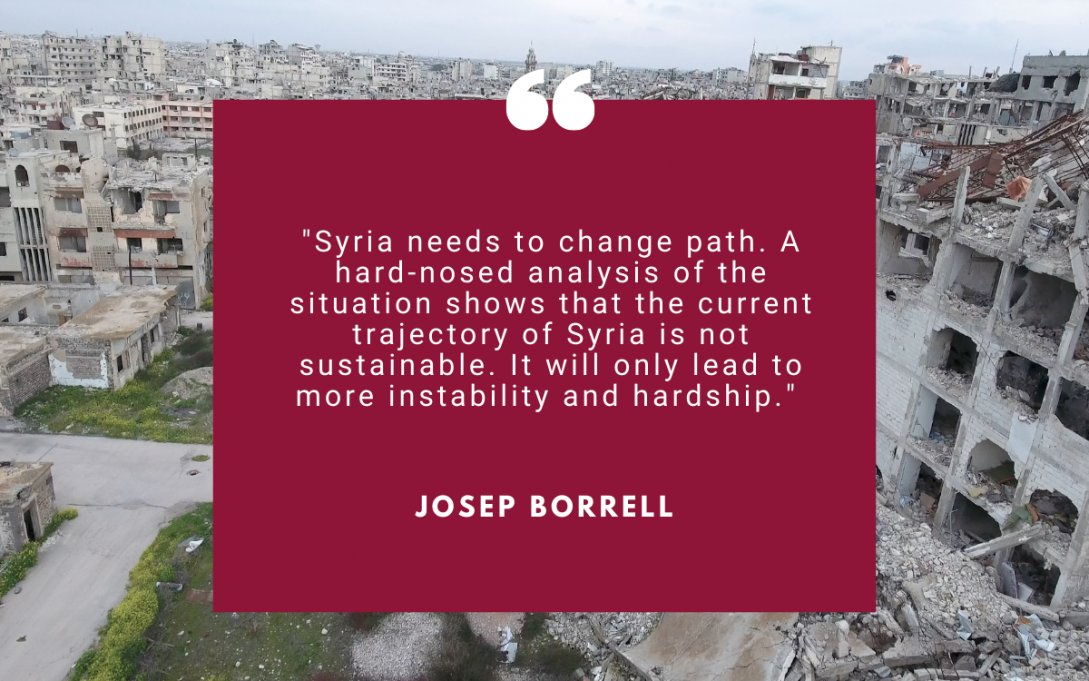Syria: ten years on we still need a political solution that addresses the root causes of the conflict

We all know how devastated Syria is. How much its people have suffered, for ten years now, and what they still endure every day. Syria has become synonymous with death, destruction, and this century’s largest human exodus.
We should never forget how it all started. Exactly a decade ago, in the tidal wave of the Arab Spring, ordinary Syrians took to the streets peacefully asking for freedom, justice and economic perspectives. The regime responded with extreme violence, at a level unseen elsewhere in the region. The situation escalated into a deadly conflict.
We know all the horrors of this conflict but some key figures bear repeating: over 400,000 people have died, perhaps 100.000 have disappeared. The economy is in freefall. Around 90% of Syrians live in poverty. Over 13 million Syrians – nearly 60% of the population and half of them children – are facing severe food insecurity and need humanitarian assistance. Over 12 million Syrians have fled their homes. In northern Syria, hundreds of thousands live in tents. The past year, the pandemic has further worsened the already dire situation.
"The conference, which gathered over 85 delegates from more than 55 countries and over 25 international organisations, enabled us to jointly generate €5,3 billion of new pledges."
Throughout the past ten years, the EU and its member states have been the largest provider of support to Syrians. Yesterday, during the fifth Brussels Conference on “Supporting the Future of Syria and the Region”, the EU pledged another €560 million, the same amount as last year. They add up to the close to €25 billion we have delivered since the start of the crisis. The conference, which gathered over 85 delegates from more than 55 countries and over 25 international organisations, enabled us to jointly generate €5,3 billion of new pledges.
Now people sometimes wonder how the money that gets pledged at this type of events is actually distributed, reaching the people in need. Last year, at the Fourth Brussels Conference in 2020, donors pledged €4.9 billion in grants and macro financial funding for all the following purposes: support humanitarian, resilience, stabilisation, development activities in Syria and the region, and a further €2 billion for 2021 and beyond. We keep track of these promises and last week we published the financial tracking report, which shows that as of January 2021 donors have contributed with €6.8 billion in grants to Turkey, Egypt, Iraq, Jordan, Lebanon and Syria. It means that this is 54% more than the original amount pledged at last year’s conference. That is good news, even if everybody knows that money alone does not solve the crisis. But the financial support is badly needed. And for years our support has made the difference, both within Syria and its neighbourhood.
Yet does this bring Syria anywhere closer to the end of the conflict? Anywhere closer to addressing the root causes of the crisis, namely the demands of the Syrians back in 2011 for reform and justice?
It does not.
A new generation of Syrians have only known war. They need a future and ask for it. Syria cannot be rebuilt on the same foundations that led to its collapse. Going back to pre-2011 Syria is not an option. Even the inner circle of the regime knows it. Even Russia and Iran know it.
"No matter how difficult, we need Syrians to sit together, look back at the causes of the war and unite around a vision for their country's future."
Our interest, as Europeans, is simple and it is what Syrians want too: we need Syria back on its feet, as a stable neighbour. No matter how difficult, we need Syrians to sit together, look back at the causes of the war and unite around a vision for their country's future. Aspirations for a free, safe and dignified life. Safety for refugees to return. A real search for the missing and the disappeared. And yes, accountability for the many war crimes and crimes against humanity that have been committed.
Just last week, on 21 March, there was a deliberate shelling by the Syrian regime of a medical facility in Atareb. It killed five medical staff and six patients. The hospital is now inoperable. Its GPS co-ordinates had been shared by the UN with all warring parties. This is another crime for which evidence is being collected, awaiting justice.
We know from direct experience how hard it is, but we need to move forward with the political process. International actors and the parties have agreed that Syria should have a new constitution and UN-supervised, free and fair elections.
After ten years of conflict, perhaps this seems unrealistic. A pipe dream. Yet a hard-nosed analysis of the situation shows that the current trajectory of Syria is not sustainable. It will only lead to more of the instability and hardship that we see already.
Syria needs to change path. Only a different Syria will be stable and prosperous, and a reliable partner to its neighbours and the international community. Even Syria’s allies can no longer afford to prop up a faltering regime. Indeed, without a political solution, refugees and displaced persons will not return.
The onus is therefore on the Syrian regime to take the steps set out in UN Security Council resolution 2254. If it takes steps in the right direction, we will respond. Until that moment, we will keep up the pressure. There will be no end to sanctions, no normalisation, no support for reconstruction until a political transition is underway. This is the long-standing position of the European Union. I recalled it in my statement marking the ten years of war, and I reiterated it to our international partners at the Fifth “Brussels Conference” that I co-chaired this week with UN Special Envoy Pedersen.
The EU will continue to engage diplomatically with all actors involved in the Syria conflict – the UN, the US, Russia, Turkey, Iran, Arab countries and others – to build a consensus that can put an end to the war. In parallel, and this is equally important, we will continue to engage with civil society. Their voice is crucial, as I saw for myself when meeting them this week, to understand fully what is happening, what is needed, and how tomorrow’s Syria can be shaped. They carry hope for the future, for a peaceful and different Syria. They are not giving up, and neither are we.
The future of Syria belongs to no single faction and to none of the outside powers. It is for Syrians to decide, in Syrian-owned and Syrian-led negotiations under the auspices of the United Nations. Denying the Syrians’ needs and demands, denying them their dignity, will only waste more time and bring more misery.
MORE FROM THE BLOG

“A Window on the World” – by HR/VP Josep Borrell
Blog by Josep Borrell on his activities and European foreign policy. You can also find here interviews, op-eds, selected speeches and videos.
